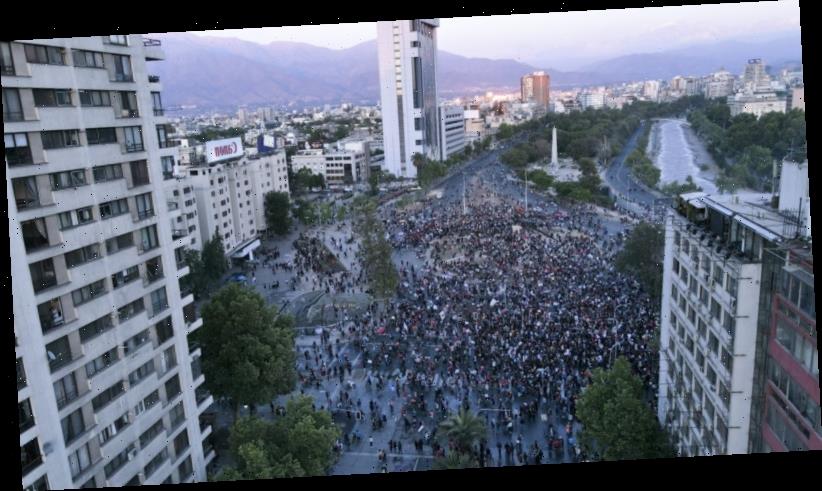Save articles for later
Add articles to your saved list and come back to them any time.
Santiago: Chileans have turned out in record numbers to vote on whether to tear up the country's Pinochet-era constitution in favour of a fresh charter drafted by citizens – a key demand of fierce anti-government protests that erupted last year.
"This is a triumph for all Chileans who love democracy, unity and peace," said a President Sebastian Piñera as the votes were being counted.
The Electoral Service said on Sunday evening (Monday AEDT) that of the first 1.3 million ballots counted, 77.5 per cent favoured a new charter and less than 22.5 per cent were opposed. Among the 60,000 Chileans living abroad who voted in 65 nations, the vote was 86 per cent for a new constitution and 13 per cent against, officials said. About 15 million Chileans were eligible to vote.
Anti-government protesters gather on Plaza Italia, Santiago, on the day Chileans voted in a referendum to decide whether the country should replace its dictatorship-era constitution.Credit:AP
Electoral and government officials and analysts pointed to a particularly high turnout and significant representation of young people among voters, despite the country continuing to be blighted by the coronavirus pandemic and recent violence linked to the demonstrations.
The country's conservative government agreed with the center-left opposition to allow the plebiscite after vast street protests erupted a year ago with a hike in transport fares but culminated in frustration over inequality in pensions, education and healthcare in what has long been one of South America's most developed nations.
Demonstrators burn a doll depicting General Augusto Pinochet on a horse, on the day of the referendum.Credit:AP
Recent polls indicated heavy backing for a new constitution despite opposition from conservative groups, and centre-right Piñera said after voting that he assumed the measure would be approved.
“I believe the immense majority of Chileans want to change, modify our constitution,” he said.
A special convention would then begin drafting a new constitution to be submitted to voters in mid-2022.
The current constitution was drafted by the dictatorship of General Augusto Pinochet, and was sent to voters at a time when political parties had been banned and the country was subject to heavy censorship.
It was approved by 66 per cent of voters in a 1980 plebiscite, but critics say many voters were cowed into acceptance by a regime that had arrested, tortured and killed thousands of suspected leftist opponents following the overthrow of an elected socialist government.
“I think that many people went to vote out of fear,” said political scientist Claudio Fuentes, who wrote a book about that plebiscite titled, The Fraud.
“The current constitution has a flaw of origin, which is that it was created during the military dictatorship in an undemocratic process,” said Monica Salinero, a 40-year-old sociologist who supports drafting a new charter.
The free-market principles embodied in that document led to a booming economy that continued after the return to democracy in 1990, but not all Chileans shared.
A minority was able to take advantage of good, privatised education, health and social security services, while others were forced to rely on sometimes meagre public alternatives. Public pensions for the poorest are just over $US200 ($280) a month, roughly half the minimum wage.
Luisa Fuentes Rivera, a 59-year-old food vendor, hoped that “with a new constitution we will have better work, health, pensions and a better quality of life for older people, and a better education.”
But historian Felipe Navarrete warned, “It's important to say that the constitution won't resolve the concrete problems. It will determine which state we want to solve the problems.”
Claudia Heiss, head of the political science department at the University of Chile, said it would send a signal about people's desires for change, and for a sort of politics that would “allow greater inclusion of sectors that have been marginalised from politics.”
Conservative groups fear the revamp could go too far, and endanger parts of the constitution that have helped the country prosper.
Electoral officers tally votes in Santiago during Sunday’s constitutional referendum.Credit:Getty Images
“The people have demonstrated saying they want better pensions, better health, better education, and the response of the political class” is a process that won’t solve the problems and will open a period of uncertainty,” said Felipe Lyon, 28-year-old lawyer and spokesman for the group “No, Thanks” that opposes the change.
The decision to allow the vote came after hundreds of thousands of Chileans repeatedly took to the streets in protests that often turned violent.
The vote was initially scheduled for April, but was delayed due to the COVID-19 pandemic which has killed some 13,800 Chileans. More than 500,000 people, or one in four Chileans, have been infected by the new coronavirus.
Officials trying to ensure voters felt safe barred infected persons or those close to them from the polls, and long lines formed at voting places. Voters had to wear masks — dipping them only briefly for identification purposes — and brought their own pencils.
The manner of drafting a new constitution was also on the ballot. Voters were choosing between a body of 155 citizens who would be elected just for that purpose in April, or a somewhat larger convention split equally between elected delegates and members of Congress.
AP, Reuters
Most Viewed in World
Source: Read Full Article



